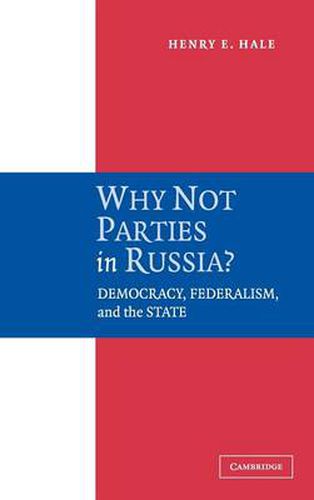Readings Newsletter
Become a Readings Member to make your shopping experience even easier.
Sign in or sign up for free!
You’re not far away from qualifying for FREE standard shipping within Australia
You’ve qualified for FREE standard shipping within Australia
The cart is loading…






Russia poses a major puzzle for theorists of democracy: virtually every classic work takes parties to be inevitable and essential to democracy, but Russia has remained highly nonpartisan more than 15 years since Gorbachev first launched his democratizing reforms. The problem is that theories of democracy lack a ‘control case’, almost always focusing on cases where parties have already developed and almost never examining countries where independent politicians are the norm. This book focuses on Russia as just such a control case. It mobilizes fresh public opinion surveys, interviews with Russian politicians, careful tracking of campaigns, and analysis of national and regional voting patterns to show why Russia stands out. Russia’s historically influenced combination of federalism and ‘superpresidentialism’, coupled with a postcommunist redistribution of resources to regional political machines and ‘oligarchic’ financial-industrial groups, produced and sustained powerful ‘party substitutes’ that have squeezed Russia’s real parties out of the ‘electoral market’.
$9.00 standard shipping within Australia
FREE standard shipping within Australia for orders over $100.00
Express & International shipping calculated at checkout
Russia poses a major puzzle for theorists of democracy: virtually every classic work takes parties to be inevitable and essential to democracy, but Russia has remained highly nonpartisan more than 15 years since Gorbachev first launched his democratizing reforms. The problem is that theories of democracy lack a ‘control case’, almost always focusing on cases where parties have already developed and almost never examining countries where independent politicians are the norm. This book focuses on Russia as just such a control case. It mobilizes fresh public opinion surveys, interviews with Russian politicians, careful tracking of campaigns, and analysis of national and regional voting patterns to show why Russia stands out. Russia’s historically influenced combination of federalism and ‘superpresidentialism’, coupled with a postcommunist redistribution of resources to regional political machines and ‘oligarchic’ financial-industrial groups, produced and sustained powerful ‘party substitutes’ that have squeezed Russia’s real parties out of the ‘electoral market’.